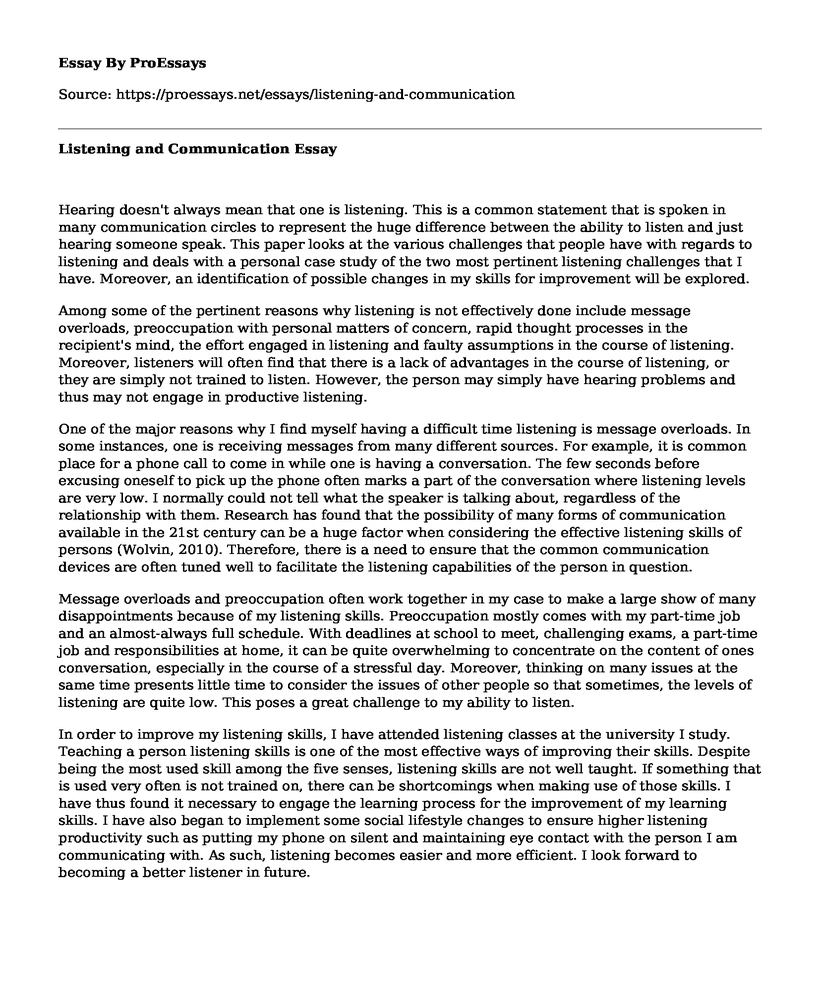Hearing doesn't always mean that one is listening. This is a common statement that is spoken in many communication circles to represent the huge difference between the ability to listen and just hearing someone speak. This paper looks at the various challenges that people have with regards to listening and deals with a personal case study of the two most pertinent listening challenges that I have. Moreover, an identification of possible changes in my skills for improvement will be explored.
Among some of the pertinent reasons why listening is not effectively done include message overloads, preoccupation with personal matters of concern, rapid thought processes in the recipient's mind, the effort engaged in listening and faulty assumptions in the course of listening. Moreover, listeners will often find that there is a lack of advantages in the course of listening, or they are simply not trained to listen. However, the person may simply have hearing problems and thus may not engage in productive listening.
One of the major reasons why I find myself having a difficult time listening is message overloads. In some instances, one is receiving messages from many different sources. For example, it is common place for a phone call to come in while one is having a conversation. The few seconds before excusing oneself to pick up the phone often marks a part of the conversation where listening levels are very low. I normally could not tell what the speaker is talking about, regardless of the relationship with them. Research has found that the possibility of many forms of communication available in the 21st century can be a huge factor when considering the effective listening skills of persons (Wolvin, 2010). Therefore, there is a need to ensure that the common communication devices are often tuned well to facilitate the listening capabilities of the person in question.
Message overloads and preoccupation often work together in my case to make a large show of many disappointments because of my listening skills. Preoccupation mostly comes with my part-time job and an almost-always full schedule. With deadlines at school to meet, challenging exams, a part-time job and responsibilities at home, it can be quite overwhelming to concentrate on the content of ones conversation, especially in the course of a stressful day. Moreover, thinking on many issues at the same time presents little time to consider the issues of other people so that sometimes, the levels of listening are quite low. This poses a great challenge to my ability to listen.
In order to improve my listening skills, I have attended listening classes at the university I study. Teaching a person listening skills is one of the most effective ways of improving their skills. Despite being the most used skill among the five senses, listening skills are not well taught. If something that is used very often is not trained on, there can be shortcomings when making use of those skills. I have thus found it necessary to engage the learning process for the improvement of my learning skills. I have also began to implement some social lifestyle changes to ensure higher listening productivity such as putting my phone on silent and maintaining eye contact with the person I am communicating with. As such, listening becomes easier and more efficient. I look forward to becoming a better listener in future.
References
Wolvin, A. (2010). Listening and human communication in the 21st century (pp. 7-30). Malden, MA: Wiley-Blackwell.
Cite this page
Listening and Communication. (2021, Mar 14). Retrieved from https://proessays.net/essays/listening-and-communication
If you are the original author of this essay and no longer wish to have it published on the ProEssays website, please click below to request its removal:
- Paper Example on Concept of Sociology of Emotions
- Essay Example on Kurds: The 4th Largest Ethnic Group in Middle East
- Essay Example on Play Reversed: Betrayal Unveiled in Decade-Long Relationship
- Essay Example on My Journey to Become an Eco-Activist: A High School Grad's Story
- Essay Example on Feminist Analysis of Gender Concepts: Examining the Concept of a Man
- Jimmy Valentine Saves the Day: A Story of Bravery and Love - Essay Sample
- Paper Example on Exploring Stigma Impacts on Adolescents' Self and Relationships







